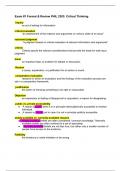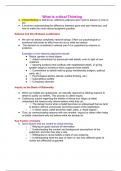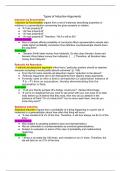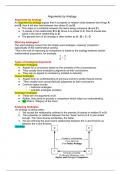Baileyharvey
On this page, you find all documents, package deals, and flashcards offered by seller baileyharvey.
- 21
- 2
- 4
Community
- Followers
- Following
28 items

Chapter 3 (arguments)
Arguments are collections of statements that are used to logically support a specific point. They consist of premises, which justify the conclusion, and the logical form that connects the premises to the conclusion. Premises and conclusions are statements that are declarative in grammatical form, factual, and in principle verifiable. Certain words or phrases, known as "tell words," can be used to identify whether a statement is a premise or a conclusion. Common tell words include "therefor...
- Package deal
- Class notes
- • 5 pages •
Arguments are collections of statements that are used to logically support a specific point. They consist of premises, which justify the conclusion, and the logical form that connects the premises to the conclusion. Premises and conclusions are statements that are declarative in grammatical form, factual, and in principle verifiable. Certain words or phrases, known as "tell words," can be used to identify whether a statement is a premise or a conclusion. Common tell words include "therefor...

Exam #1 Format & Review PHIL 2303: Critical Thinking
Exam #1 for PHIL 2303: Critical Thinking will include questions on various topics such as inquiry, critical evaluation, reasoned judgment, criteria, issues, reasons, comparative evaluation, justification, objections, public vs. private accessibility, widely-available vs. narrowly-available reasons, fallibility, fallacy, bias, counterexamples, context, state of practice, autonomy, confirmation bias, curiosity, open-mindedness, fair-mindedness, respect for reason, factual judgments, evaluative jud...
- Package deal
- Summary
- • 3 pages •
Exam #1 for PHIL 2303: Critical Thinking will include questions on various topics such as inquiry, critical evaluation, reasoned judgment, criteria, issues, reasons, comparative evaluation, justification, objections, public vs. private accessibility, widely-available vs. narrowly-available reasons, fallibility, fallacy, bias, counterexamples, context, state of practice, autonomy, confirmation bias, curiosity, open-mindedness, fair-mindedness, respect for reason, factual judgments, evaluative jud...

Chapters 1,2 (what is critical thinking, The nature of inquiry, The guidlines of inquire)
Critical thinking refers to reflective judgment on what to believe or how to act. It involves recognizing good and bad reasoning and making rational judgments based on evidence. While our psychological and emotional side can influence our beliefs and actions, a rational decision is supported by reasons or evidence. Non-rational judgments include biases, commitment to existing beliefs despite new evidence, ignoring conflicting evidence, and relying on beliefs held by a group or psychological fact...
- Class notes
- • 5 pages •
Critical thinking refers to reflective judgment on what to believe or how to act. It involves recognizing good and bad reasoning and making rational judgments based on evidence. While our psychological and emotional side can influence our beliefs and actions, a rational decision is supported by reasons or evidence. Non-rational judgments include biases, commitment to existing beliefs despite new evidence, ignoring conflicting evidence, and relying on beliefs held by a group or psychological fact...
Unit 5 Types of Inductive Arguments
- Flashcards
- • 16 items •

Exam 3 notes for phil 2303 Critical Thinking
These documents cover both Unit 5 and 6 notes and give definitions, background, and examples of critical vocabulary that you need to know for the exam. These units are called types of inductive arguments and arguments by analogy.
- Package deal
- • 2 items •
- Unit 6 Arguments by Analogy • Class notes
- Unit 5 Types of Inductive Arguments • Class notes
These documents cover both Unit 5 and 6 notes and give definitions, background, and examples of critical vocabulary that you need to know for the exam. These units are called types of inductive arguments and arguments by analogy.

Unit 5 Types of Inductive Arguments
This documents has examples of induction arguments and the different types of inductive arguments. there are examples, critical factors and definitions of these different inductions.
- Package deal
- Class notes
- • 2 pages •
This documents has examples of induction arguments and the different types of inductive arguments. there are examples, critical factors and definitions of these different inductions.

Unit 6 Arguments by Analogy
These notes give definitions, background, and examples of arguments and analogies. as well as describes different types of analogies and arguments.
- Package deal
- Class notes
- • 2 pages •
These notes give definitions, background, and examples of arguments and analogies. as well as describes different types of analogies and arguments.
